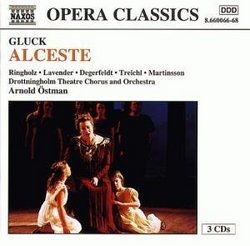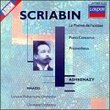| All Artists: Christoph Willibald Gluck, Arnold Ostman, Teresa Ringholz, Justin Lavender, Jonas Degerfeldt, Miram Treichl, Lars Martinsson, Drottningholm Theatre Chorus and Orchestra Title: Gluck: Alceste / Ostman, Ringholz, Lavender, Degerfeldt, et al Members Wishing: 0 Total Copies: 0 Label: Naxos Release Date: 8/31/1999 Genre: Classical Styles: Opera & Classical Vocal, Historical Periods, Classical (c.1770-1830), Symphonies Number of Discs: 3 SwapaCD Credits: 3 UPC: 730099606622 |
Search - Christoph Willibald Gluck, Arnold Ostman, Teresa Ringholz :: Gluck: Alceste / Ostman, Ringholz, Lavender, Degerfeldt, et al
 | Christoph Willibald Gluck, Arnold Ostman, Teresa Ringholz Gluck: Alceste / Ostman, Ringholz, Lavender, Degerfeldt, et al Genre: Classical
Gluck's Alceste typifies his no-nonsense, reformed approach to opera. There are no wasted notes, no explosive high passages, no coloratura; in short, other than stark drama and beautiful, expressive, exclamatory music and ... more » |
Larger Image |
CD DetailsSynopsis
Amazon.com Gluck's Alceste typifies his no-nonsense, reformed approach to opera. There are no wasted notes, no explosive high passages, no coloratura; in short, other than stark drama and beautiful, expressive, exclamatory music and singing, very little for a voice-loving opera fan to sink his or her teeth into. That said, this new set--the first recording of Gluck's Italian version of the work--will fill the bill somewhat if it's Alceste you're after. Teresa Ringholz is good in the title role, but she seems to understate the part; a bit more high drama would not have been out of place. Justin Lavendar is effective as her hubby, although he, too, has a very light voice. This undercasting may have been on purpose; it's Arnold Ostman with his Drottningholm forces on period instruments, and the entire scale of the show is therefore slight. Nonetheless, this is a fascinating if rigid work, and this recording is a good way to get to know it. --Robert Levine Similar CDs
Similarly Requested CDs
|
CD ReviewsMost Welcome Michael K. Halloran | 12/09/1999 (5 out of 5 stars) "This, the first complete recording of Gluck's original Italian version of "Alceste," is an excellent achievement. Before this recording, I knew only the primary arias from the French "Alceste" recorded by Callas and Janet Baker. Both of these divas give an electrifying performance of "Divinites du Styx," the most familiar aria. Here, titled "Ombre, larve," the aria is simpler, less assured, and perhaps not as fully developed as the French revision. However, throughout the entire opera, the simplicity of line and the musical distillation of emotion which Gluck sought is supremely evident. To compare this work to the opera seria of Handel's time almost forty years earlier is to realize the true extent of Gluck's reforms.The cast is, for the most part, excellent. Teresa Ringholz brings a lovely, rather soft-grained instrument to Alceste's music and sings with a firm line and dramatic commitment, if perhaps without the fire of a Callas or Baker. A fuller chest register would be an asset in this music, but that is a small point. She is quite good and dominates this set as she should. Justin Lavender here sounds a little unfocused and woolly, qualities I have not heard in him before, so I am willing to chalk it up to a peculiarity in the recorded sound. Other than that, he makes a fine Admeto. A couple of unsteady minor roles aside, the rest of the cast is very good.Arnold Oestman leads the Drottningholm Orchestra and Chorus with style and excellent control. Everything is well-paced and the recitatives are lively and involving, never dull. Despite this being a live performance, the stage noises are almost nonexistant. Naxos has provided an English translation alongside the Italian libretto, and the cueing points are more than generous. While we are unlikely to have another recording of "Alceste" (French or Italian) anytime soon, I can't see this set being bettered. Tremendous value and an excellent buy. Don't miss it." A German Romantic view of Euripides F. Behrens | Keene, NH USA | 09/07/1999 (4 out of 5 stars) "It is good to have not only a complete version of Gluck's pioneering in its original Italian form but a budget one at that on wallet-friendly Naxos label (8.660066-68). Here we have Arnold Ostman conducting the renowned Drottingholm Theatre Chorus and Orchestra, which more or less guarantees a no-nonsense performance of a work that was designed to strip away the silliness imposed on Italian opera by egomaniacal singers (what else is new?) and/or overly complacent composers (e.g., Handel). "Beautiful simplicity" was Gluck's goal and this he certainly achieved. Now this is not the Euripides version with Hercules providing laughs. Indeed, there is no moment of any real joy until the opening of the second scene in Act II and that is short-lived when Admetus finds it is his wife who will die in his place. The action moves along very leisurely indeed, now and then making one long for a display of coloratura. But Alceste is no Medea. As much as I have admired Teresa Ringholz in recordings of Herbert and Romberg, I feel she holds back the histrionics a bit, especially in the opening of Act II when she confronts the Gods of the Underworld. On the other hand, playing her as a frightening you wife is also valid. To each his own. The rest of the cast -- Justin Lavender, Jonas Degerfeldt, Miriam Treichi, and others--are adequate to quite good. Interested readers might want to compare the treatment of this legend with Handel's "Admeto," now available on Virgin Veritas label. A complete text with Italian and English is provided; and I want to thank Naxos for the very generous tracking cues to make life easier." Gluck's Alceste Robin Friedman | Washington, D.C. United States | 03/16/2004 (5 out of 5 stars) "This is a rare CD in that it allows the listener to explore a seldom-performed version of a great opera that, in whatever its versions, is too little known. Christoph Willibald Gluck (1714-1787) first composed Alceste in Vienna in 1767 to a liberetto in Italian by Ranieri de' Calzabigi. This early version of the work included a famous preface(1769) in which Gluck criticized the florid style of operatic composition of his day. He set out to reform opera by creating a music to fit and complement the passion of the text and to realize what he termed a "beautiful simplicity." Gluck revised Alceste in Paris in 1776 with a French librettist named Roullet. This is the version more frequently heard. In it, Gluck compromised somewhat on the musical creed he articulated in his 1769 Preface to the Vienna version of his opera. The Naxos CD, conducted by Arnold Ostman with the Drottnigholm (Sweden) Theatre Chorus and Orchestra, uses the early Vienna score. It appears to be the only performance of the Vienna score of Alceste currently available on CD.Gluck's Alceste is based upon the play of Euripides. It tells how Admetus, the King of Sicily, is told of his impending death and of how an oracle states that Admetus will be allowed to live but only if someone steps forward to take his place. Only his wife, Alceste, bravely comes forward.The opera takes us through a scene in Hades, (Gluck's earlier opera, Orpheus and Eurydice also has a scene in Hades where the male protagonist, Orpheus, charms the forces of Hades to allow his wife to return to life) where Alceste promises to die for her husband. This scene is followed by a tearful parting with Admetus and the couple's two children. At the last moment, Apollo appears, releases Alceste from her vow, and allows both Admetus and Alceste the gift of life.The story and Gluck's opera celebrates woman's love and the power of love to overcome death. (In some respects, Gluck's operas remind me of Beethoven's Fidelio.) The music is strong, angular, simple, and passionate. True to his announced programme, Gluck's arias are forceful and have immediate appeal. The work also is full of short orchestral interludes and pantomines and opens with a grand overture in the minor key which sets out the tragic nature of the story. Gluck's short overture is a masterpiece in its own right and was among the first operatic overtures in which the composer tried to set the stage for the action which followed.The leading role of Alceste is performed by American soprano Teresa Ringholz and she performes admirably in this daunting, passionate role. Tenor Justin Lavender sings the part of Admetus, but the performance here belongs to Ms. Ringholz.This CD offers the listener a wonderful opportunity to get to know Gluck's music and to hear a work that may be unfamiliar to most in its initial version. Gluck's operas remain widely praised but too little performed. This disc will give the listener Alceste in its simplicity and its passion."
|

 Track Listings (29) - Disc #1
Track Listings (29) - Disc #1









